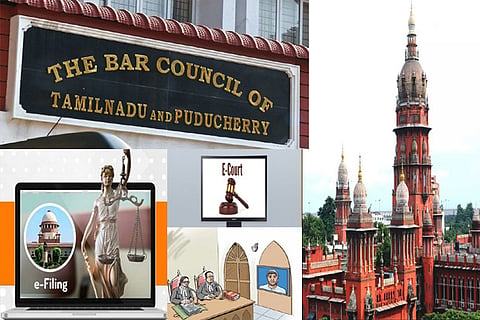

Chennai
The Supreme Court tried out e-court process last month when a three-judge bench led by Justice DY Chandrachud undertook the first paperless proceedings. There were no paper files before the bench and the case files were transferred to the judges a day ahead so they could study them and make notes on their computers. The bench had listed 23 matters and the hearing reportedly progressed without a glitch, offering hope that it would be the trial run that would encourage all courts to go paperless.
But that would involve not just the advocates presenting their cases through video conferencing, but the judges, too, deploying available technological solutions to access the documents referred to on their computers.
For instance, despite allowing filing through email, the Madras High Court issued a guideline specifying that even for filing via email, hard copies of case papers would also have to be furnished before the case can be numbered. Teething technical issues faced by the Registry, especially in terms of printing the case papers and placing them before the judges, were cited as a reason for seeking hard copies.
Many advocates note that they have no issues in submitting hardcopies, and noted that the process has just begun and that the shortcomings would be addressed in the coming days.
Lauding the Registry and staff for equipping themselves to establish hearing through video conferencing despite short notice, advocate Richard Wilson said with every judicial matter linked to hardcopy and officials, too, still insisting on hardcopy of court orders, the evolution to completely paperless court was going to take a while.
“Judges have been very accommodative during video conferencing. During a hearing when the hardcopy relating to a case was not there, the judge allowed me to transfer it through WhatsApp to the court officer and then obtained access to it,” he recalled.
However, while a section of advocates welcomes the idea of exploring the potential of digitisation to make justice delivery system more efficient and seamless, a majority of them point out several shortcomings of cases being heard through video conferencing, and are thus keen on restarting the physical functioning of the courts.
The Bar Council of Tamil Nadu and Puducherry offered several suggestions in resuming physical court proceedings, while a few advocate bodies resorted to protest outside court premises seeking the speedy resumption of physical hearing. Some lawyers have even moved the Supreme Court citing loss of livelihood.
Many feel that even after physical functioning resumes, a paperless court can be the way forward, with judges using the laptops to access case files, including the references made, ensuring that the case bundles don’t gather dust or, worse, go missing.
Visit news.dtnext.in to explore our interactive epaper!
Download the DT Next app for more exciting features!
Click here for iOS
Click here for Android